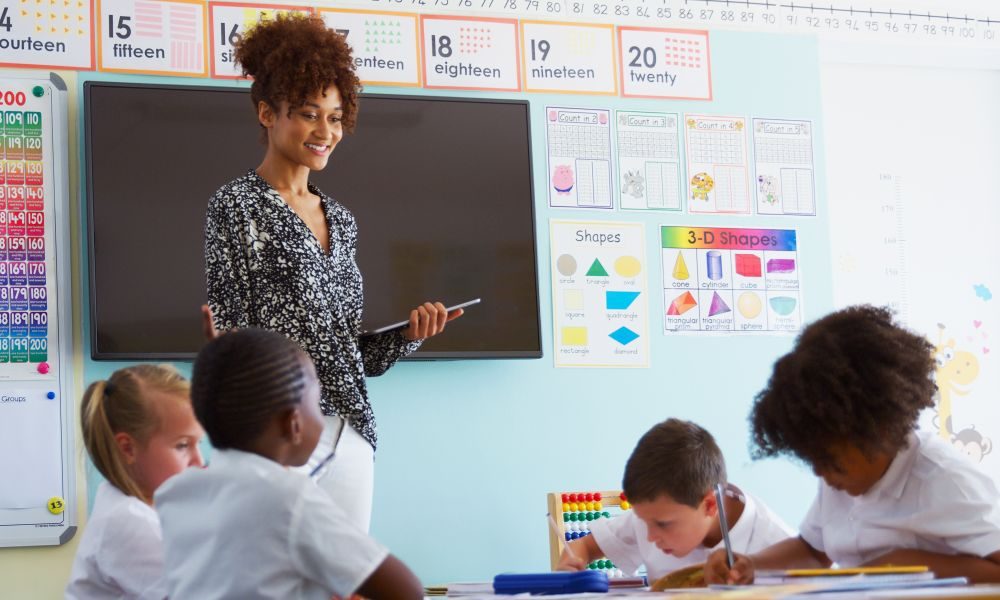This podcast from Teacher is supported by Sora, the student reading platform that provides access to curriculum and popular digital books for schools. Learn more at discoverSora.com/global.
Thanks for tuning in to this episode of Teacher Staffroom, where we catch you up on the latest evidence, insight, and action in education. I'm Dominique Russell.
What made you decide to become a teacher? As a student, were you asked if you wanted to be a teacher? At Teacher magazine, we’ve been looking at the topic of teacher recruitment recently, but perhaps from a different lens than you might think. In this episode, you’ll hear about what young people are saying about teaching as a career, how much schools in Australia have grown year on year, and why pre-service teachers have chosen to go into teaching.
Don’t forget, like all of our other episodes of Teacher Staffroom, I’ll be posing some questions throughout this podcast, so feel free to pause the audio as you go, gather some colleagues, and discuss together how these stories might be relevant to your school context. Let's jump in.
To kick us off, let me return to one of the questions I asked just before. What made you decide to become a teacher? That’s the question that almost 3,000 pre-service teachers responded to in an essay as part of a study that took place in the US. Researchers analysed their responses and were able to identify what they’ve called ‘supertopics’. In a recent infographic of ours, we shared the 10 supertopics they identified, and what really stuck out to me, was the fact that the most common supertopic was altruism, with 58% of essay responses containing a sentence on that. Other topics included the impact of prior teachers, their own positive experiences and family connections to teaching.
Our infographic also shared some direct quotes from the essays, and I’d like to share one of them with you now. Here’s an essay sentence that speaks to altruism:
[Teaching] is one of the most important jobs in today’s society because it’s not only shaping your students’ futures, but also the future of this country and our world.
Now, to look at the step before becoming a pre-service teacher – that is, being in secondary school and deciding what you might like to do for a career. We spoke to Dr Tracy Woodroffe from Charles Darwin University in the Northern Territory and she has been looking into just that. Tracy has recently completed a 12-month research project where she surveyed both Aboriginal students and teachers to gather insights and inform recommendations for encouraging Aboriginal students to consider a career in teaching.
We invited her on to the Teacher podcast to tell us about her findings – you can find the episode by scrolling down slightly in your podcast feed to ‘The Research Files Episode 98’ and it’s called ‘Getting more First Nations teachers into schools’. The episode has been a real highlight for me for this year so far, so I really encourage you to give it a listen if you haven’t already.
Some of the insights she shared were fascinating. For instance, she found that one third of the Aboriginal senior secondary students she surveyed, would consider a career in teaching. The survey also asked for ideas on how to promote teaching as a career, which was equally fascinating, I found. Some of the teachers responded with suggestions like talking about the positive parts of being a teacher but also discussing the challenges that Aboriginal people face in the education system, so that young people know and understand perhaps what to expect.
Tracy also asked the students about some ideas they had for promoting teaching as a career. Here’s a short clip of what she found in that area:
Yes, they definitely had other suggestions and the theme that kept coming up was more information. So, they want more information. You know, you just assume that they're being provided the information, but maybe not, because they all wanted more. They also really, really just wanted to have a conversation with someone. They wanted someone to please ask them: ‘Do you want to be a teacher?’ or even tell them: ‘You could be a teacher. Do you know that?’ You know, to have those high expectations and to tell them they can aspire to things like that. Students really wanted that, and they believe that they could see that if they had more role models. They really would appreciate, I think, more role models to be able to see what's possible.
So, that quote there brings me to a question for you to think about.
As a secondary school leader, reflect on the careers support provided to senior students at your school. Is an effort made to provide detailed information on teaching as a career, including what is involved in training and what supports are provided to early-career teachers?
You’re listening to a podcast from Teacher, supported by Sora, the student reading platform that provides every student with access to the right books. Sora offers your school’s curriculum titles, along with popular leisure titles available digitally anytime, anywhere. Visit discoversora.com/global today to learn why Sora is a worldwide leader for digital ebooks and audiobooks for students.
Another research project we recently covered on Teacher looks at teachers’ use of generative AI. Authors from the University of New South Wales and Monash University updated us in an article by explaining their findings from their work in this area.
Essentially, data was collected between April and July 2024, from a sample of about 370 Australian school teachers. The teachers were asked about their confidence in effectively applying generative AI to assist them with their work and also if they believe generative AI will play a helpful and productive role in their work. They were also asked about how they integrated generative AI into their work and their use of it related to student learning activities.
Their findings show that teachers who experienced higher levels of generative AI support reported greater self-efficacy and valuing towards the technology. They also found that teachers’ experiencing greater time pressure at work were more likely to value generative AI; that generative AI self-efficacy and valuing were both associated with higher levels of integration in teaching-related work. Another finding was that generative AI self-efficacy is associated with greater integration in student learning activities; and that disruptive student behaviour was not associated with the motivation or integration of generative AI. So, what does all of that mean for schools? Here’s what the authors wrote in their article:
Our study results suggest that generative AI support is an avenue that schools might want to address in order to support generative AI motivation and integration. Strategies to boost generative AI support include providing clear guidelines to teachers about the ways in which these tools can and should be used. Such efforts and guidelines are particularly crucial in light of emerging cases in other professions where generative AI has been misused by employees due to time pressure. Additionally, providing practical examples of successful generative AI implementation is important, such as assisting with parent communications or enhancing the quality of questioning.
So, that quote there brings me to another question for you to reflect on. As a teacher, are students using generative AI tools in the classroom or outside school? As well as this, how confident do you feel in using these same tools? What additional supports would help?
AI is something one of our columnists, Andreas Schleicher from the OECD, writes about in his first Teacher column for 2025. In his piece, he’s sharing findings from the latest Trends Shaping Education report, and the implications for teachers, school leaders, students and policymakers. Here’s a quote from Andreas on one of the trends – Education in the AI age:
As automation expands, the demand for critical thinking and problem-solving skills will grow. Teachers can encourage these skills by incorporating project-based learning and real-world problem-solving activities into their lessons. This approach helps students develop the ability to analyse complex situations, think creatively and devise effective solutions. In addition to technical skills, communication, teamwork and emotional intelligence are becoming increasingly valuable. Educators should constantly question what competences are needed to fully participate in society in the decades ahead. What knowledge, skills, attitudes and values are needed for generating new ideas, products and ways of working?
The column also talks about global complexities like the political climate, remote work and climate education. You can read the full piece for free at any time at our website – teachermagazine.com.
And finally, I wanted to draw your attention to a recent infographic of ours that gives a snapshot of Australian student retention, enrolments and teacher growth for the 2024 school year. The Australian Bureau of Statistics releases data on schools, staff and students in Australia each year and the latest data for 2024 show increases from 2023 in student retention, full-time equivalent teaching staff, and also student enrolment. Specifically, overall student retention moved from 79.1% in 2023 to 79.9% in 2024; overall full-time equivalent teaching staff went up by 2.8% between 2023 and 2024. And then finally, overall student enrolment went up by 1.1% in the same 12-month period, while the enrolment of Aboriginal and Torres Strait Islander students went up 3.7%.
So, some interesting figures there to end this episode, and that’s all I have for you today. Thanks for listening. I’ll leave the links to the full articles and podcast episodes I mentioned today in the transcript of this podcast episode, which you can find under the podcast tab at our website. We’ll be back with a new episode very soon.
You’ve been listening to a podcast from Teacher magazine, supported by Sora, the student reading platform that provides access to curriculum and popular digital books for schools. Learn more at discoverSora.com/global.



